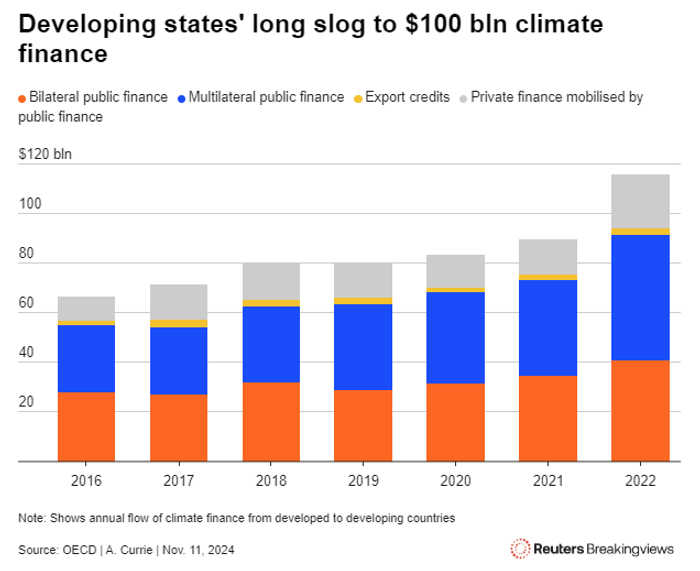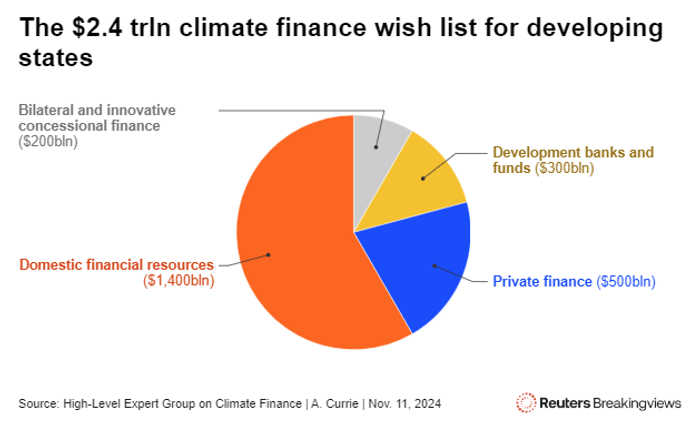Published 07:30 IST, November 12th 2024
COP29 will highlight bifurcated energy transitions
The United Nations’ 29th Conference of the Parties is due to take place in Baku, Azerbaijan, between Nov. 11 and Nov. 22.
- News
- 6 min read

Baku beyond. “I’m not going to Baku, and very few of my peers are either”. So said a senior figure at an influential European asset manager, in a chat last month with Breakingviews. Throw in the election of climate change sceptic Donald Trump as U.S. president, and the United Nations’ 29th Conference of the Parties climate change summit in Azerbaijan’s capital sounds like a non-event. Yet, while the fight against global warming is getting harder in the world’s largest economy, that’s not the case everywhere else.
Baku, on the Caspian Sea, is hosting what is billed as the “Finance COP”. One immediate problem is that even green transition-focused private sector players like Canada’s Brookfield Asset Management are either swerving this year’s gathering or sending a token force. That complicates progress on the so-called New Collective Quantified Goal (NCQG), which some academics think should require rich countries to supply $1 trillion a year by 2030 to help the developing world decarbonise and protect against floods, droughts and other disasters made worse by rising temperatures. Half of the figure is supposed to come from the private sector. And it’s a big ask overall: it took the developed world 13 years to hit a $100 billion-a-year target set in 2009.

There’s also no getting around the fact that a White House headed by Trump, who has called climate change “one of the great scams of all time”, is a serious setback. The world is already on track for a highly damaging 2.9 degrees Celsius rise in average temperatures compared to pre-industrial times, according to the United Nations – way higher than the 1.5 degrees Celsius level considered manageable. Trump’s administration is likely to increase fossil-fuel production and may try to repeal part or all of the green energy-focused Inflation Reduction Act – even though the legislation benefits states governed by his Republican Party. His policies could add 4 billion tons to carbon emissions by 2030, according to Carbon Brief – not far off 10% of the current global total.
Completing the bleak picture, China and India are still building coal-fired power plants. Saudi Arabia – like COP29 host Azerbaijan – is still drilling for fossil fuels despite COP28's resolution that countries should start 'transitioning away' from them. With the U.S. increasingly part of the problem rather than the solution, COPs may be a bust until 2029 – when Trump’s term is due to end – at the earliest.
All that said, Climate watchers do have some cause for optimism. The world is now less dependent on U.S. support for climate action than when Trump first won the White House eight years ago. His return to power is likely to shift the fight against global warming even more to the East and South.
Take China. Courtesy of its dominance of the renewable energy industry’s supply chains and production, it's now by far the global leader in green power deployment, adding 163 gigawatts of solar power generation capacity in the first nine months of the year. That’s more than the total installed solar capacity of Germany, Spain, Italy and France combined and by year-end is likely to surpass the U.S. total, points out Lauri Myllyvirta of the Centre for Research on Energy and Clean Air. It’s a similar story for wind power, he notes, with the 38 GW added over the same period greater than the UK has built overall.
The People’s Republic is also reducing transport emissions fast. Pure electric and hybrid cars accounted for more than 50% of all cars sold in recent months, according to the China Passenger Car Association, compared to less than 20% in the U.S. Meanwhile India is likely to quadruple how much renewable power capacity it adds between 2023 and 2030, the International Energy Agency estimates. That growth would outpace China’s, though admittedly from a low base of 15GW a year.
In fact, as a whole the Global South – a catch-all term for developing countries excluding China – is adopting clean energy faster than many might have expected, helped in no small part by falling prices and Beijing’s excess production capacity. Solar and wind generation have grown at an average rate of 23% in each of the past five years – faster than its rich peers in the North - according to the Rocky Mountain Institute. The nonprofit outfit estimates clean energy will soak up 87% of the bloc’s energy production capital expenditure this year.
The Global South’s green progress supports the argument economists Nick Stern and Vera Songwe made in their research framework last year and expanded upon by the High-Level Expert Panel on Climate Finance which has become the basis for the NCQG. Their numbers suggested developing economies excluding China could find $1.4 trillion annually of their own for their green transitions. On-the-ground proof that this money is being deployed may help persuade Western financiers that the $1 trillion they need to hand over a year is worth doing.

That said, progress towards that magic figure has been slow. Developing countries excluding China received just 5% of the increase in investment in clean energy over the past five years or so, even though they may by the end of the decade collectively account for more than half of global emissions, says Amar Bhattacharya at the Brookings Institute. All told, renewables still only provide 9% of electricity in the Global South, per the RMI. Poorer states are generally stymied by lower access to capital and the need to pay handsomely for it when they do get it.
Those delegates that do make it to Baku can help. Ratings agency Fitch reckons the 12 largest MDBs it covers could boost lending – on all projects, not just climate-related ones - by $480 billion without threatening their triple-A credit rating. The World Bank, meanwhile, has created more firepower by reducing its equity-to-loan ratio to 18% from 20% in two stages in the past 18 months. If World Bank Chief Ajay Banga and his peers can advance this agenda, they’d have development banks’ roughly one-third share of the $1 trillion challenge sewn up.
That won’t be easy. The only countries obligated to fund the NCQG are 23 states that were members of the OECD in 1992 when the UN Framework Convention on Climate Change was signed. The risk is Trump removes Washington’s annual climate-focused contributions to the World Bank and other multilateral development banks, which clock in at $5.9 billion, with another $1.5 billion for bilateral finance, the Center for Global Development estimates. The U.S. and European attempts to widen the contributory pool to China, Saudi Arabia and other big emitters is yet to work: Beijing insists it is a developing country and thus exempt.
Baku may epitomise the turning away of the world’s biggest economy from green issues. But it may also showcase the much larger role China, India and other countries in Asia and Latin America, have been playing to combat climate change. The problem is the climate emergency remains global.
Context News
The United Nations’ 29th Conference of the Parties is due to take place in Baku, Azerbaijan, between Nov. 11 and Nov. 22.
Updated 07:30 IST, November 12th 2024